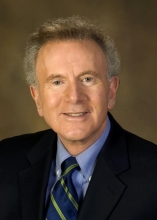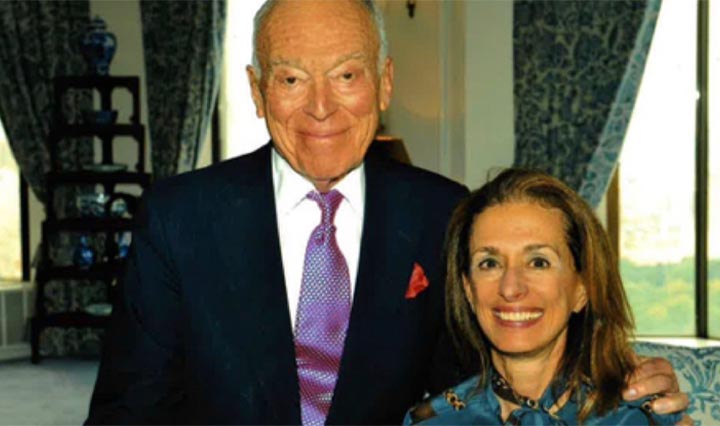 The chairman emeritus of The Estée Lauder Companies has made a $5 million gift to the University of Arizona Cancer Center. The gift from Leonard A. Lauder supports the clinical and translational research of Dr. David S. Alberts, a UA Health Sciences pioneer and expert in the field of ovarian cancer research and treatment.
The chairman emeritus of The Estée Lauder Companies has made a $5 million gift to the University of Arizona Cancer Center. The gift from Leonard A. Lauder supports the clinical and translational research of Dr. David S. Alberts, a UA Health Sciences pioneer and expert in the field of ovarian cancer research and treatment.
Dr. Alberts, who was instrumental in founding the University of Arizona Cancer Center in 1976, built its Cancer Prevention and Control Program into one of the nation's most-respected gynecologic cancer and biomarker research efforts. His National Cancer Institute-funded drug and diagnostics research has resulted in 18 patents and the co-founding of four Arizona-based pharmaceutical and biotechnology companies.
His work includes chemoprevention and treatment of breast, colon, ovarian, prostate and skin cancers, but, Dr. Alberts said, "curing ovarian cancer has been my guiding light for more than 45 years."
Dr. Alberts pioneered new treatments for advanced ovarian cancers, including in vitro tumor cell chemosensitivity testing for personalized medicine strategies, intraperitoneal chemotherapy and maintenance chemotherapy.
It was this expertise that brought Dr. Alberts to the attention of Lauder, whose mother was Estée Lauder.
 Lauder's late wife, businesswoman and philanthropist Evelyn H. Lauder, died of ovarian cancer in 2011. When a longtime friend and business associate, Rose Marie Bravo, was diagnosed in 2016 with clear cell ovarian cancer, a 5% variant that has proven very resistant, Lauder urged her to connect with Dr. Alberts.
Lauder's late wife, businesswoman and philanthropist Evelyn H. Lauder, died of ovarian cancer in 2011. When a longtime friend and business associate, Rose Marie Bravo, was diagnosed in 2016 with clear cell ovarian cancer, a 5% variant that has proven very resistant, Lauder urged her to connect with Dr. Alberts.
Bravo was already being treated by Dr. Konstantin Zakashanky of New York City's Mount Sinai Medical Center, who performed two surgeries on her. Alberts worked with Zakashanky remotely to design a schedule for Bravo's treatment using drugs for individualized therapy. She is now in complete remission.
"David is remarkable," Bravo said. "He never gives up on his patients and always was available to discuss any issue. His collaboration with my primary oncologist, Dr. Zakashanky, was the key."
Ovarian cancer is relatively rare, striking 1 in 78 women. The survival rate has increased sixfold since Dr. Alberts began his research at the National Cancer Institute in the late 1960s.
"This gift is already making a seminal impact on my laboratory-based research," Dr. Alberts said. "For example, we have initiated a new project to develop an inexpensive home kit to measure concentration of vitamin D3 in the blood. We are also attempting to identify and prioritize those nutrients and physical activities that may prolong complete remissions in patients entered into the NRG LIVES trial." Dr. Alberts and Dr. Cyndi Thomson are principal investigators on the trial, along with Dr. Tracy Crane, the national research coordinator. NRG Oncology is an international cancer clinical trials network group.
"I am incredibly grateful to Mr. Lauder for his faith in Dr. Alberts and his work at the University of Arizona Health Sciences," said University of Arizona President Robert C. Robbins. "Dr. Alberts and his team are deepening our understanding and application of personalized ovarian cancer treatment. This unrestricted gift will allow Dr. Alberts to explore promising new research certain to benefit patients for decades to come."
"For more than 40 years, Dr. Alberts and his research team have been at the forefront of discovering how to prevent cancer at the molecular level through targeted drug interventions, as well as how to predict when intraepithelial neoplasias will become invasive cancers in various tissues," said Dr. Michael D. Dake, senior vice president for University of Arizona Health Sciences. "This generous gift from Mr. Lauder is vital to furthering those efforts, which we fully expect will create new pathways for precision treatments and, eventually, a cure for ovarian cancer."
"This gift is an incredible tribute to Dr. Alberts," said John-Paul Roczniak, president and CEO of the University of Arizona Foundation. "I am proud of the role Dr. Alberts and the university played in Ms. Bravo's treatment, and am grateful to Mr. Lauder for his desire to expand that impact by deepening the research around treatment of women who have drug-resistant clear cell ovarian carcinomas."
During his career, Dr. Alberts has served as an adviser to numerous cancer research foundations and national research committees, such as chair of the Oncologic Drug Advisory Committee to the Food and Drug Administration (1984-1986). He was a member of the NCI's Board of Counselors (to the Division of Cancer Prevention, 1990-1994), the Board of Scientific Advisors (1999-2006) and the coordinating subcommittee for the NCI's Clinical Translational Advisory Committee (2006-2009). He served as director of the University of Arizona Cancer Center from 2005-2013, and was granted a director emeritus title by the University of Arizona Health Sciences in 2013. He also was the founder and committee chair of the Gynecologic Cancer Committee (1980-2002) in the Southwest Oncology Group and the Cancer Prevention and Control Committee (1995-2017) in the Gynecologic Oncology Group. In June 2001, the journal Science published that he was, for almost a decade, the third highest funded clinical translational research Principal Investigator in the U.S., funded by the National Institutes of Health. He is the only scientist to receive the American Association for Cancer Research's Joseph H. Burchenal Award (2003) and Pioneer Award in Cancer Prevention (2014). He has published more than 950 scientific editorials and reviews, including 570 peer-reviewed original research articles concerning the prevention and treatment of a wide range of cancers.
Original story at https://uanews.arizona.edu/story/5m-gift-leonard-lauder-advances-ovarian-cancer-research

